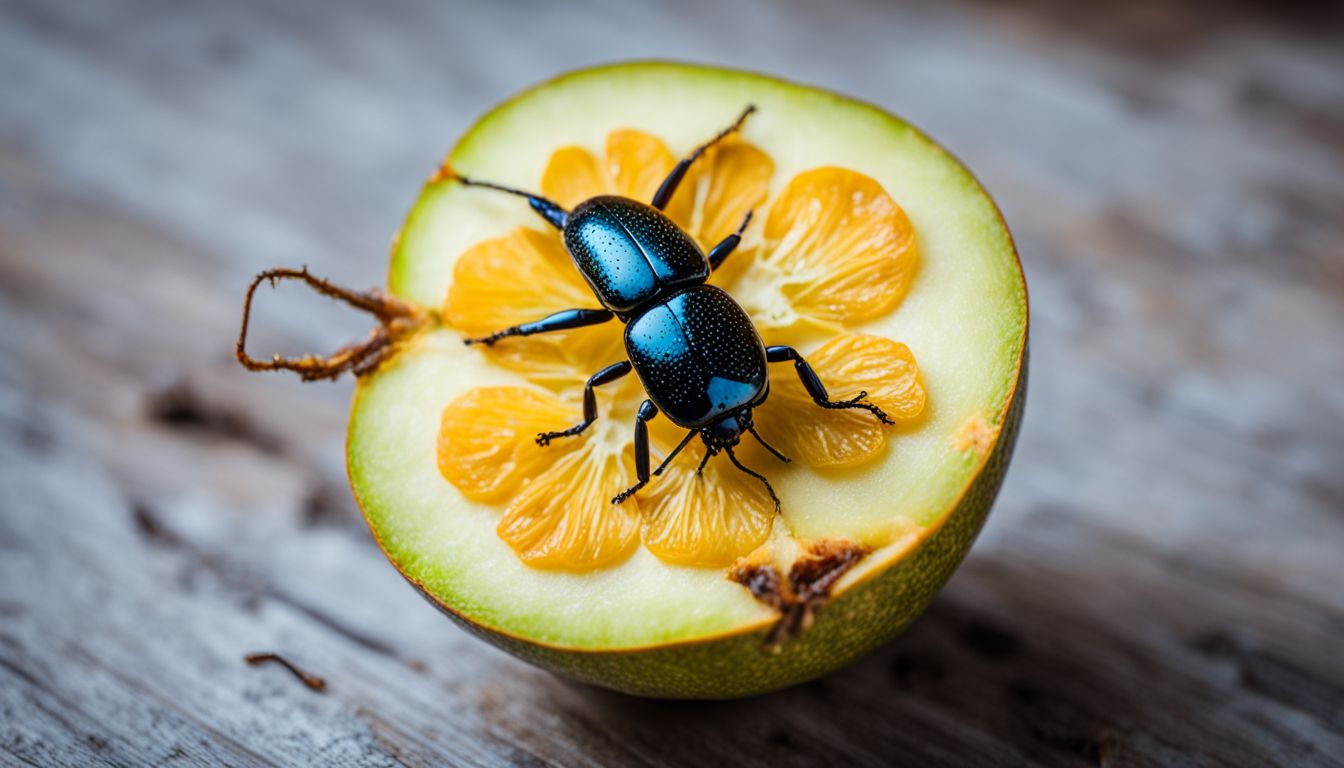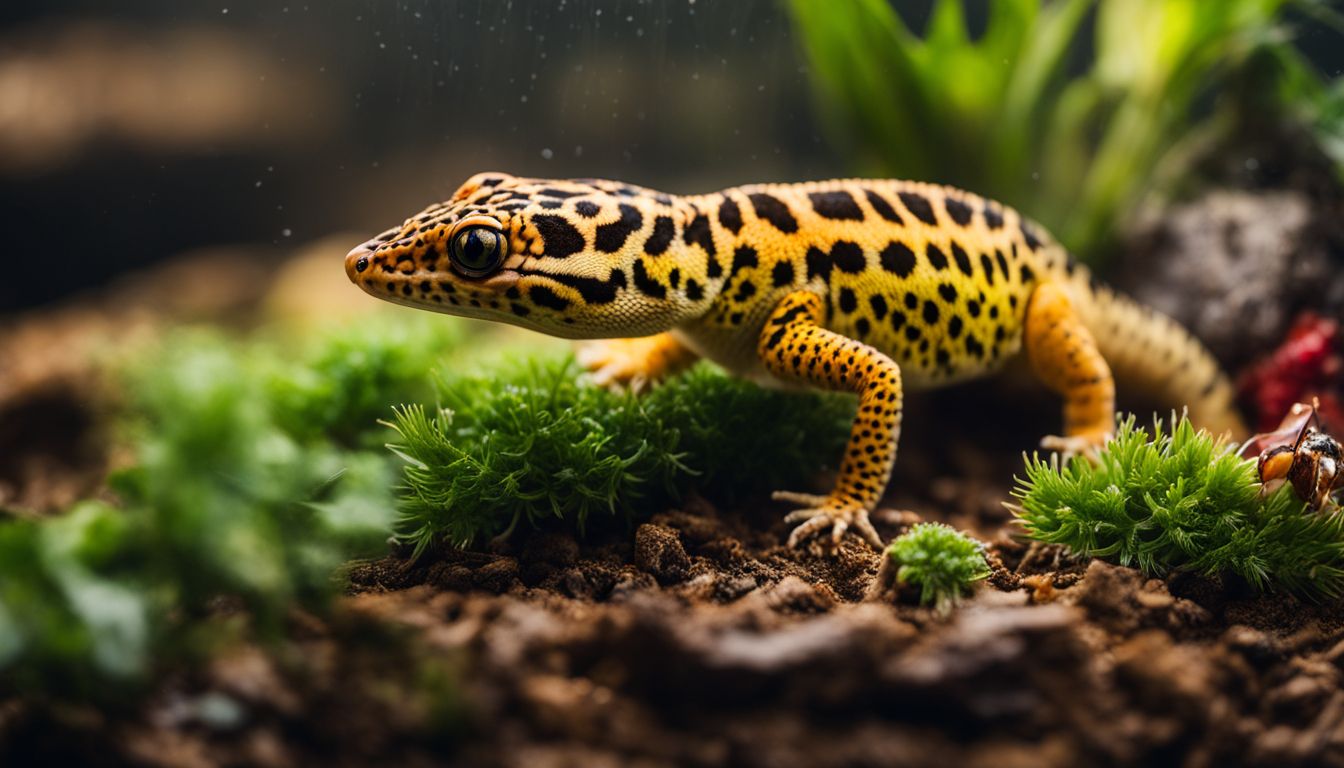Are you curious about spicing up your leopard gecko’s menu with some crunchy critters? As a dedicated owner, you’re always on the lookout for new and nutritious snacks to keep your scaly friend happy and healthy.
Darkling beetles might have caught your eye as a potential treat, but you may be wondering if these insects are safe for your gecko to eat. It’s important to know what’s best for their diet before introducing anything new.
Here’s a fun fact: Leopard geckos can indeed munch on darkling beetles! But there’s more to learn about how these little beetles fit into your pet’s meals. Our guide is packed with information from nutritional value to feeding tips—everything you need to know about adding darkling beetles to your gecko’s diet.
Get ready to discover how this could be a crunchy and enjoyable addition!
Keep reading, and let’s dive into the world of leopard geckos and their beetle-based banquets!
Key Takeaways
- Leopard geckos can safely eat darkling beetles, as they provide essential nutrients like calcium and contribute to dental health.
- It’s crucial to ensure that the size of the beetle is appropriate for easy consumption by your gecko, as larger beetles may pose a risk of impaction.
- Feeding darkling beetles should be done in moderation due to their tough exoskeletons, and it’s important to incorporate a variety of insect prey into their diet for balanced nutrition.
What Are Darkling Beetles?

Darkling beetles are interesting little bugs that many people know as mealworm beetles. They start their life as tiny worms called mealworms. After a while, these worms change into darkling beetles.
These beetles have hard shells and can move around quite well. They like to eat different kinds of fruits, grains, and even dead plants or animals.
Leopard geckos find these insects fun to chase and eat because they wiggle a lot. Darkling beetles also have calcium in them, which is good for the gecko’s bones. But make sure the beetle isn’t too big for your gecko to gobble up! Now let’s see if it’s safe for leopard geckos to snack on these crunchy critters.
Can Leopard Geckos Safely Eat Darkling Beetles??

Leopard geckos can safely eat darkling beetles as part of their diet. These insects provide essential nutrients for the geckos, but there are potential risks and precautions to consider before feeding them to your pets.
Nutritional Value of Darkling Beetles for Leopard Geckos
Darkling beetles are a good snack for leopard geckos. They have calcium and also help make mealtime fun. These small insects are tough, which means they can help keep your gecko’s teeth healthy.
But they’re not as full of good stuff as the baby worms, or larvae, that turn into these beetles.
When you give darkling beetles to your pet gecko, be sure they are the right size. The beetle should not be bigger than the space between your gecko’s eyes. This helps stop your friend from getting sick because it ate something too big.
Next up: what risks might come with feeding these bugs to your leopard geckos?.
Potential Risks and Precautions
Feeding darkling beetles to leopard geckos comes with some risks. These beetles are harder and can be tough to digest. If the beetle is too big, it could cause impaction in your gecko’s stomach, which is serious and needs a vet’s help.
Always make sure the beetle size matches what your gecko can handle. Look for signs that your pet struggles with eating or pooping after having beetles.
It’s also important to feed these insects less often than softer bugs like mealworm larvae. This helps prevent any digestive problems from happening because of their hard shells. Offer a mix of foods so your lizard gets all they need without too much risk.
Next up, let’s find out how you should give darkling beetles to your leopard gecko friends!
How to Feed Darkling Beetles to Leopard Geckos
When feeding darkling beetles to leopard geckos, it’s essential to consider the appropriate size for different gecko ages and the frequency and quantity of feedings. This section will provide you with all the information you need to ensure your leopard gecko gets the right amount of nutrition from darkling beetles.
Appropriate Beetle Size for Different Gecko Ages
Beetles should be smaller for young geckos, about the size of their head. For adult geckos, beetles can be larger but should not exceed the width between their eyes. Offering appropriately-sized beetles helps prevent choking or digestion issues for leopard geckos at different ages.
When determining suitable beetle sizes, consider the age and size of your gecko to ensure they can consume them safely without any problems. Now let’s move on to understanding the frequency and quantity of feeding darkling beetles in the next section.
Frequency and Quantity of Feeding Darkling Beetles
After considering the appropriate beetle size for different gecko ages, it’s essential to understand the frequency and quantity of feeding darkling beetles.
- Offer darkling beetles to juvenile leopard geckos 2-3 times per week, with each feeding consisting of 2-3 appropriately sized beetles.
- Adult leopard geckos can be fed darkling beetles once or twice a week, with 4 – 6 beetles per feeding session.
- Monitor your gecko’s behavior and appetite to adjust the frequency and quantity of darkling beetle feedings as needed.
- Ensure a balanced diet by incorporating other insect prey such as crickets and silkworms alongside darkling beetles.
Alternative Foods for Leopard Geckos
Leopard geckos can also be fed a variety of other insects, such as mealworms, superworms, and silkworms. Additionally, incorporating fruits into their diet can provide essential vitamins and minerals for their overall health.
Variety and Balanced Diet Importance
Leopard geckos need a varied and balanced diet to stay healthy. Providing different types of insects, such as crickets and silkworms, ensures they get the necessary nutrients. Mixing up their food also prevents them from getting bored with their meals.
A diverse diet can prevent nutritional deficiencies in leopard geckos. It’s essential to offer a variety of insect prey to meet their dietary needs. This may include mealworm beetles, which some geckos enjoy, along with other suitable feeders for these insectivorous reptiles.
Setting Up a Darkling Beetle Colony for Feeding
To ensure a steady supply of darkling beetles for feeding your leopard gecko, setting up a beetle colony is a great option. By providing the right environment and food for the beetles, you can create a sustainable source of nutrition for your gecko.
Plus, it’s fascinating to observe the life cycle of these insects from larvae to adults.
Essentials for Culturing Your Own Beetles
Culturing your own beetles for feeding your leopard gecko can be a rewarding and cost-effective way to ensure a steady supply of nutritious food. Here are the essentials you’ll need to get started:
- Housing: Use a plastic or glass container with a secure lid and ventilation holes to prevent escape and provide airflow.
- Substrate: Opt for a substrate such as oats, wheat bran, or dry pet food to create a suitable environment for the beetles.
- Temperature: Maintain temperatures between 75-85°F (24-29°C) using an under-tank heater or heat lamp to promote beetle activity and breeding.
- Moisture: Keep the substrate lightly moist, but not wet, by misting it with water every few days to prevent dehydration.
- Feeding: Offer the beetles slices of fruits and vegetables like carrots, apples, or potatoes as a source of moisture and nutrition.
- Breeding: Provide egg-laying sites such as small containers filled with substrate for the female beetles to lay their eggs.
- Light: Ensure that the container receives 12-14 hours of light per day from ambient light or artificial sources to simulate natural conditions.
FAQs About Leopard Geckos and Darkling Beetles
Leopard geckos can eat darkling beetles and mealworm beetles. But it depends on the individual gecko’s preference.
Some leopard geckos enjoy eating mealworm beetles as part of their diet, while others may not be interested.
Darkling beetles are a suitable food option for leopard geckos due to their calcium content and hard exoskeletons.
Ensure the size of the beetle is appropriate for easy consumption by your gecko.
Avoid feeding your leopard gecko only with mealworm beetle nutrition, include other live insect prey in their diet too.
Remember that an appropriate diet for leopard geckos should consist primarily of live, moving insect prey.
Unlike other common pet reptiles like iguanas or bearded dragons, leopard geckos do not eat vegetables or plants.
Conclusion
In summary, leopard geckos can safely eat darkling beetles as part of their diet. This is practical and beneficial for their nutritional needs. Have you considered introducing darkling beetles to your gecko’s diet? Make sure to provide appropriate-sized beetles and monitor their digestion carefully.
By offering a variety of nutritious foods, you can ensure the health and happiness of your pet gecko. Remember, a balanced diet plays a crucial role in maintaining the well-being of these insectivorous reptiles.
Discover more fascinating behaviors by exploring whether leopard geckos play dead when threatened.
FAQs
1. Can leopard geckos eat darkling beetles?
Yes, leopard geckos can eat darkling beetles as part of their diet.
2. Are darkling beetles safe for leopard geckos to consume?
Yes, darkling beetles are safe for leopard geckos to eat and are a good source of nutrition for them.
3. How often should I feed my leopard gecko darkling beetles?
You can feed your leopard gecko with darkling beetles once or twice a week as part of a varied diet including other insects.
4. Can feeding too many darkling beetles harm my leopard gecko?
Feeding an excessive amount of any one type of food may lead to nutritional imbalances, so it’s important to provide a diverse diet along with the beetle consumption.
5. What are the health benefits of feeding darkling beetles to leopard geckos?
Darkling beetles offer essential nutrients such as protein and calcium that contribute to the overall health and well-being of your pet leopard gecko.




